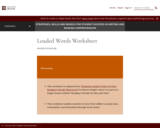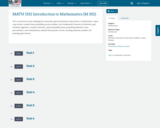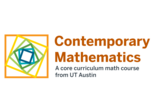
Lesson 3
- Subject:
- Mathematics
- Material Type:
- Lesson
- Author:
- Lindsey Jones
- Date Added:
- 06/27/2024

Lesson 3

Lesson 4

Lesson 12

Lesson 13

Lesson 14

Lesson 11

Lesson 10

Lesson 6

Lesson 17

Lesson 7

Lesson 8

Lesson 9

Lesson 18

This resource contains activity handouts, a rubric, a facilitation guide, and tex files. The material is meant to be used for those teaching a college algebra course. The activities are meant to provide a deeper understanding (than a traditional course offers) of some of the topics covered in a college algebra course. The activities are intended for group activities and options exist for use in a single class or multiple classes.

This resource contains activity handouts and considerations for facilitators. This resource is part of the Teaching Excellence Toolkit to help accomplish the College Readiness Goal: I want students to learn from their mistakes.Activity Description:After assignments are returned, provide students an activity in which they analyze and learn from a mistake they made on the assignment or reflect on a part of the assignment they found particularly challenging.

This resource contains activity handouts and considerations for facilitators. This resource is part of the Teaching Excellence Toolkit to help accomplish the College Readiness Goal: I want students to collaborate effectively for learning.

This resource contains activity handouts, a rubric, a facilitation guide, and tex files. The material is meant to be used for those teaching a college algebra course. The activities are meant to provide a deeper understanding (than a traditional course offers) of some of the topics covered in a college algebra course. The activities are intended for group activities and options exist for use in a single class or multiple classes.

Some words may not cause a particular emotional reaction whereas other words with similar meanings may fire up anger, joy, fear, or other emotions. Authors may choose to use more emotional words to convey a particular tone in their writing, and critical readers need to be aware of this literary device to maintain an objective view of the topic and not be subtly swayed by the author’s attitude.
In this worksheet, students will evaluate groups of words and identify the choice that suggests a more emotional response. The objective is for students to hone their ability to assess tone, connotation, and denotation through word choice.
Author: Sharon Haigler
Editor: Mary Landry, C. Anneke Snyder
Supervisor: Terri Pantuso

This is a terminal course satisfying the University's general education requirement in mathematics. Topics may include: number theory (divisibility, prime numbers, the Fundamental Theorem of Arithmetic, gcd, Euclidean Algorithm, modular arithmetic, special divisibility tests), probability (definition, laws, permutations, and combinations), network theory (Euler circuits, traveling salesman problem, bin packing), game theory.

TCCNS CourseMATH 1332: Contemporary MathematicsUT Austin CourseM 302: Introduction to Mathematics